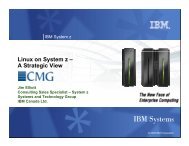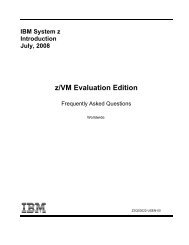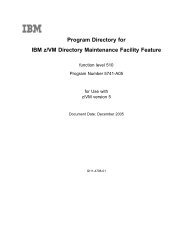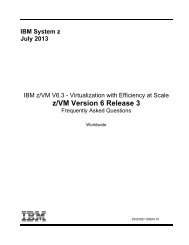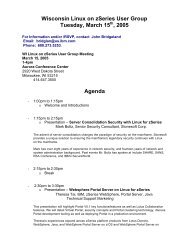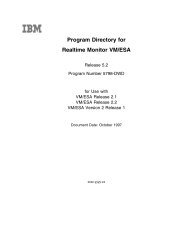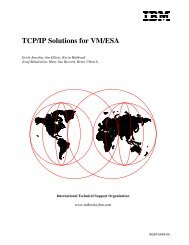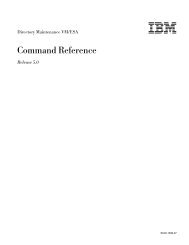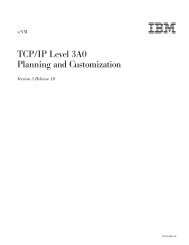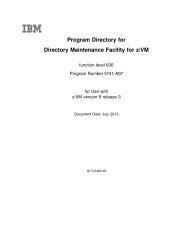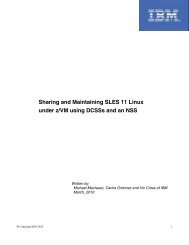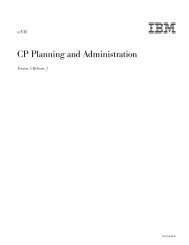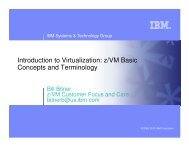z/VSE: 45 Years of Progress - z/VM - IBM
z/VSE: 45 Years of Progress - z/VM - IBM
z/VSE: 45 Years of Progress - z/VM - IBM
You also want an ePaper? Increase the reach of your titles
YUMPU automatically turns print PDFs into web optimized ePapers that Google loves.
Diagnosing<br />
CICS Problems<br />
Using No-<br />
Charge<br />
Supplied<br />
Facilities<br />
By Phyllis Don<strong>of</strong>rio<br />
In this age <strong>of</strong> budget-challenged IT<br />
resources, many sites are finding it<br />
necessary to use facilities readily<br />
available and shipped with the product<br />
rather than turning to outside sources<br />
that usually come with a monthly or<br />
yearly license fee. While those products<br />
are certainly admirable and usually provide<br />
function not available with the<br />
supplied facilities, they may be beyond<br />
the reach <strong>of</strong> some shops’ budgets.<br />
With that in mind, it may be worth<br />
reviewing facilities that you may not<br />
have known were available or may have<br />
forgotten were updated and shipped<br />
with every new release. The CICS developers<br />
in Hursley, U.K., spend a great<br />
deal <strong>of</strong> resources and effort to keep<br />
these facilities current, and provide support<br />
for new product enhancements<br />
that come with every release. There may<br />
be a time when Hursley resources, just<br />
as our own, are stretched and decisions<br />
must be made whether to continue support<br />
for some <strong>of</strong> these facilities.<br />
The CICS Operations Guide<br />
The CICS Operations Guide is one <strong>of</strong><br />
two publications that document the<br />
facilities and the proper syntax for using<br />
them. Updated with every release, the<br />
CICS Operations Guide uses a vertical<br />
bar (|) to show whether a facility has<br />
been added or changed with that particular<br />
release. While these facilities<br />
aren’t “CICS Supplied Transactions,”<br />
they’re modules or utilities shipped to<br />
assist customers with diagnosing CICS<br />
problems and support issues. Make sure<br />
you use the publication that matches<br />
the version <strong>of</strong> CICS you’re running.<br />
While this publication contains a great<br />
deal <strong>of</strong> information, this article will<br />
cover three components:<br />
• DFHEISUP: the load module scanner<br />
• DFHDUnnn: the transaction dump<br />
formatter<br />
• DFHPDnnn: the system dump formatter.<br />
The “nnn” in the module name refers<br />
to the particular version/release <strong>of</strong> CICS<br />
you’re using. Every version must be formatted<br />
with its own module; for example,<br />
DFHDU640 would format dumps<br />
from CICS TS 3.2. These modules ship<br />
with every release and refer to control<br />
blocks specific to that release.<br />
Load Module Scanner<br />
The load module scanner,<br />
DFHEISUP, is a utility that helps you<br />
identify which load modules in your<br />
CICS load libraries contain specific<br />
Application Program Interface (API) or<br />
Serial Peripheral Interface (SPI) commands<br />
you’ve listed or identified. For<br />
example, if you know a command<br />
should be changed to take advantage <strong>of</strong><br />
a new feature in CICS, you can use the<br />
load module scanner to identify all the<br />
program modules that contain that<br />
command. For example, you could look<br />
for threadsafe or non-threadsafe commands.<br />
The list <strong>of</strong> API commands that<br />
aren’t threadsafe is well-documented<br />
and can be used with this utility to<br />
determine if applications currently running<br />
are viable candidates. Many customers<br />
can’t find (or don’t have) the<br />
source to some <strong>of</strong> the old legacy programs,<br />
so this utility could be used<br />
without source code, scanning only the<br />
module from the existing load library.<br />
Transaction Dump Formatter<br />
The transaction dump utility program,<br />
DFHDUnnn, formats transaction<br />
dumps written to DFHDMPA or<br />
DFHDMPB, whichever is specified in<br />
the batch job. These dump data sets are<br />
retained across a restart <strong>of</strong> CICS, but<br />
once opened a second time, the contents<br />
are rewritten and the previous<br />
contents are removed. If you wish to<br />
retain any history <strong>of</strong> these dumps, a<br />
process should be created to regularly<br />
copy them to files so they can be referenced.<br />
There are several program products<br />
that format these dumps and retain<br />
the output, but again, if your installation<br />
is budget-constrained, this utility is<br />
available and shipped free with the<br />
product.<br />
A sample job stream for this utility is<br />
well-documented in the CICS Operations<br />
Guide. Simple and straightforward, it<br />
1 4 • z / J o u r n a l • O c t o b e r / N o v e m b e r 2 0 1 0



